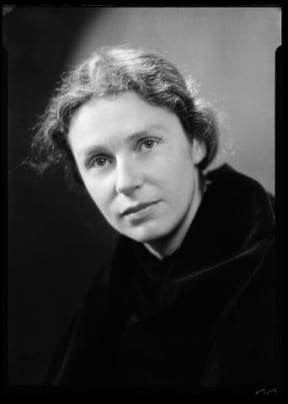Soprano Joanne Roughton-Arnold joins NZTrio to perform the NZ premiere of Gillian Whitehead and Fleur Adcock's short opera, 'Iris Dreaming', based on the life of Robin Hyde.
'Iris Dreaming' is a short one-woman opera by Gillian Whitehead to a libretto by Fleur Adcock. The one woman is London-based New Zealand soprano Joanne Roughton-Arnold who is also the person responsible for the commissioning of the work.
See below for a video conversation between Gillian Whitehead, Joanne Roughton-Arnold, and Elizabeth Kerr.
It was Fleur Adcock who suggested the poet-novelist-journalist Iris Wilkinson, otherwise known as Robin Hyde, as the subject.

Robyn Hyde Photo: Public Domain
The opera was first performed in London in 2016. The original version was scored for ten musicians and for this New Zealand première, Gillian Whitehead has reduced the forces down to a piano trio.
Iris Wilkinson's short life was eventful, but ultimately a tragic one – she died by her own hand at the age of 33. Fleur Adcock has wryly suggested that the drama, and even the melodrama, of her life are almost as if she was asking to have an opera written about her.
The opera falls into five sections. The first and last focus on her lonely room in Notting Hill at the end of her life. She is looking back at her life. She is suffering from a tropical disease she caught in China. She is in constant pain from a permanently damaged knee and she contemplates the morphine she is addicted to.
The middle sections are contemplations on various events.
In Section 2 she thinks about the births of her two children – a stillborn child she had when she was 20 and a little boy she conceived deliberately as an unmarried woman to console herself on her earlier loss. This second child was given to foster parents.
In Section 3 we see her struggling against depression in Auckland, desperately trying to juggle her responsibilities: the son Derek, her job on a newspaper and her writing as a poet and novelist. After attempting suicide she is placed in a mental hospital where she is able to write obsessively.
The biggest adventure of her life was a trip to China in 1938 and this is the focus of Section 4. Her idea was to write a book about her experiences and to earn money to solve her problems. However this is the time of the Sino-Japanese War. She encounters great dangers, witnesses some gruesome sights, but falls in love with the Chinese people and culture. She eventually has to escape, doing so narrowly, and makes her way to London for the final few months of her life. There, with the Second World War approaching, she yearns for China, thinks tenderly about New Zealand and slides into a dream.

